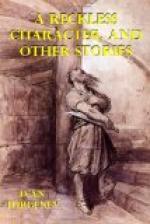Ivan submitted, to all appearances; he began to drive as coachman. As he was a proficient in that line his master speedily took a fancy to him,—the more so as Ivan behaved very discreetly and quietly, and the horses throve under his care; he tended them so that they became as plump as cucumbers,—one could never leave off admiring them! The master began to drive out more frequently with him than with the other coachmen. He used to ask: “Dost thou remember, Ivan, how unpleasant was thy first meeting with me? I think thou hast got rid of thy folly?” But to these words Ivan never made any reply.
So, then, one day, just before the Epiphany, the master set out for the town with Ivan in his troika with bells, in a broad sledge lined with rugs. The horses began to ascend a hill at a walk, while Ivan descended from the box and went back to the sledge, as though he had dropped something.—The cold was very severe. The master sat there all wrapped up, and with his beaver cap drawn down over his ears. Then Ivan pulled a hatchet out from under the skirts of his coat, approached his master from behind, knocked off his cap, and saying: “I warned thee, Piotr Petrovitch—now thou hast thyself to thank for this!”—he laid open his head with one slash. Then he brought the horses to a standstill, put the cap back on his murdered master’s head, and again mounting the box, he drove him to the town, straight to the court-house.
“Here’s the general from Sukhoy for you, murdered; and I killed him.—I told him I would do it, and I have done it. Bind me!”
They seized Ivan, tried him, condemned him to the knout and then to penal servitude.—The merry, bird-like dancer reached the mines—and there vanished forever....
Yes; involuntarily—although in a different sense,—one repeats with Alexyei Sergyeitch:—“The old times were good ... well, yes, but God be with them! I want nothing to do with them!”
THE SONG OF LOVE TRIUMPHANT
(1881)
MDXLII
DEDICATED TO THE MEMORY OF GUSTAVE FLAUBERT
Wage du zu irren und zu traeumen!
SCHILLER.
The following is what I read in an Italian manuscript:
I
About the middle of the sixteenth century there dwelt in Ferrara—(it was then flourishing under the sceptre of its magnificent dukes, the patrons of the arts and of poetry)—there dwelt two young men, named Fabio and Muzio. Of the same age and nearly related, they were almost never separated; a sincere friendship had united them since their early childhood, and a similarity of fate had strengthened this bond. Both belonged to ancient families; both were wealthy, independent, and without family; the tastes and inclinations of both were similar. Muzio occupied himself with music, Fabio with painting.




